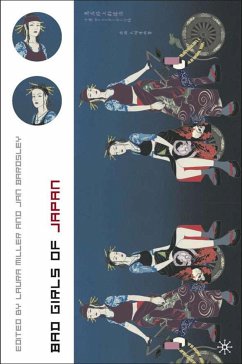Are bad girls casualties of patriarchy, a necessary evil, or visionary pioneers? The authors in this volume propose shifts in our perceptions of bad girls by providing new ways to understand them through the case of Japan. By tracing the concept of the bad girl as a product of specific cultural assumptions and historical settings, Bad Girls of Japan maps new roads and old detours in revealing a disorderly politics of gender. Bad Girls of Japan explores deviancy in richly diverse media: mountain witches, murderers, performance artists, cartoonists, schoolgirls and shoppers gone wild are all part of the terrain.
"Miller and Bardsley have amassed a fascinating collection of bad-girl tales - from geisha to fashionistas, Filipinas to schoolgirls, crones to idols. More importantly, they frame these bad girls of Japan within historical and contemporary complexities of gender, sexuality, race, class, and modernity. Here we find that one era s bad girl becomes another s model of womanhood. Amidst this surfeit of riches, Miller and Bardsley themselves take on the task of bad-girl provocateurs, disrupting commonly held notions with in-your-face, intellectual naughtiness. In their hands, bad is good if it sets tongues wagging to reclaim the territory of you go, girl! deviance." - Christine R. Yano, Dept. of Anthropology, University of Hawaii
"Bad Girls of Japan reminds us how powerful a tool feminist analysis can be for understanding gendered societies, laying bare both the fundamental structure of institutions and attitudes and also the cultural nuances that inflect gender assumptions in different places. In a nutshell, bad girls in Japan are females who are insufficiently ashamed of their own desires. But girls and women have desires, sometimes disturbing but frequently simply to control their own movements, incomes, and lives. This rich and well-written collection of essays shows what happens culturally and historically when they try to satisfy those desires." - Laura Hein, Department of History, Northwestern University
"The book has provided a fascinating insight into the ways in which Japanese women are and have been represented and imagined." - Sarah Smart, London Metropolitan University
"Bad Girls of Japan reminds us how powerful a tool feminist analysis can be for understanding gendered societies, laying bare both the fundamental structure of institutions and attitudes and also the cultural nuances that inflect gender assumptions in different places. In a nutshell, bad girls in Japan are females who are insufficiently ashamed of their own desires. But girls and women have desires, sometimes disturbing but frequently simply to control their own movements, incomes, and lives. This rich and well-written collection of essays shows what happens culturally and historically when they try to satisfy those desires." - Laura Hein, Department of History, Northwestern University
"The book has provided a fascinating insight into the ways in which Japanese women are and have been represented and imagined." - Sarah Smart, London Metropolitan University








